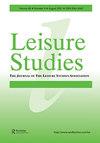赛马和标签行动主义的增长
IF 2.3
2区 社会学
Q2 HOSPITALITY, LEISURE, SPORT & TOURISM
引用次数: 0
摘要
墨尔本杯是澳大利亚的顶级赛马赛事,每年吸引超过8万名现场观众(在新冠肺炎之前),还有许多人通过全国各地和海外的直播观看。然而,最近有越来越多的人呼吁抵制这一活动,原因是对马匹的待遇感到担忧。在社交媒体的支持下,游说反对赛马的新标签运动也出现了。然而,在以动物为基础的休闲和娱乐文学中,很少有人关注这些数字运动。在这项研究中,我们调查了这样一个日益增长的运动,即#Nuptothecup。我们将探讨赛马是如何被数字活动人士框定的,揭示他们的道德、社会文化和政治反对意见。我们的研究结果表明,社会正在向强烈的动物伦理情绪转变,同时对赛马行业及其更广泛的社会影响产生了更普遍的蔑视。我们认为,如果#Nuptothecup和相关活动继续发展下去,世界杯最终可能会失去其社会运营执照。此外,如果要确保其作为澳大利亚娱乐机构的生存,我们将考虑管理者重塑赛马形象和实践的潜在机会。本文章由计算机程序翻译,如有差异,请以英文原文为准。
Horse racing and the growth of hashtag activism
The Melbourne Cup is Australia’s pinnacle horse racing event, attracting more than 80,000 physical attendees each year (pre-COVID-19), as well as numerous others watching via live broadcasts around the country and overseas. In recent times, however, there have been growing calls to boycott the event, following concerns over the treatment of horses. New hashtag movements lobbying against horse racing have also emerged, aided by the affordances of social media. However, very little attention has been paid to these digital movements in the animal-based leisure and recreation literature. In this study, we investigate one such growing movement, namely, #Nuptothecup. We explore how horse racing is framed by digital activists, revealing their moral, socio-cultural, and political objections. Our findings suggest a societal shift towards a strong animal ethics sentiment combined with a more generalised disdain towards the racing industry and its wider societal ramifications. We argue that if #Nuptothecup and related activisms continue to gain momentum, the Cup may eventually lose its social licence to operate. Further, we consider potential opportunities for managers to reinvent horse racing’s image and practices, if it is to secure its survival as an Australian recreational institution.
求助全文
通过发布文献求助,成功后即可免费获取论文全文。
去求助
来源期刊

Leisure Studies
HOSPITALITY, LEISURE, SPORT & TOURISM-
CiteScore
4.90
自引率
14.30%
发文量
85
期刊介绍:
Leisure Studies publishes articles of a high standard on all aspects of leisure studies and from a variety of disciplinary bases, including sociology, psychology, human geography, planning, economics, etc. Shorter research notes and book reviews are also published. The emphasis of the Journal is on the social sciences, broadly defined, and the subjects covered include the whole range of leisure behaviour in the arts, sports, cultural and informal activities, tourism, urban and rural recreation.
 求助内容:
求助内容: 应助结果提醒方式:
应助结果提醒方式:


